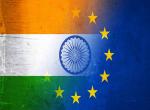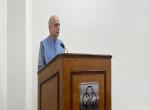Crown Prince of Saudi Arabia Mohammad Bin Salman (MBS) is on his Asian tour starting with Islamabad. Saudi Arabia has been a major benefactor of Pakistan and once again being driven by Pakistan PM Imran Khan he even declared himself to be the Ambassador of Pakistan in his own country and acceded to Imran’s request to release 3000 Pakistanis from the Saudi jails - an instant gratification apart from giving them several bail out packages despite the Pulwana massacre of Indian CRPF soldiers in which the Pakistan based terrorist Masood Azhar’s Jaesh-e-Mohammed (JeM) has been involved. He seems to have bought the Pakistani version even though Saudi Arabia condemned the terrorist attack and claimed to stand with India. However, MBS indeed will face major Indian concerns in this regard when he comes to India next before visiting Malaysia and China.
Saudi Arabia has been a close and important strategic partner for India and plays an exceedingly important role in India’s energy security and welfare dynamic of the Indian diaspora. At least since the visit of the then King Abdullah bin Abdul-Aziz Al Saud in 2006 and the return visit of former Prime Minister Man Mohan Singh to Saudi Arabia in 2010 the relationship moved into a higher and definitive orbit. The Delhi and Riyadh declarations defined the future contours of the new direction the relationship was going to take. This was further highlighted with the visit of Prime Minister Narendra Modi to Saudi Arabia in 2016 when the highest honour was also conferred upon him. In the context of India’s focus on West Asia, that visit enabled the discussions on vide range of areas of mutual interest and elevated the existing strategic partnership.
Prime Minister Modi had also invited Crown Prince Mohammed Bin Salman to pay a state visit to India. On the side-lines of multilateral meetings also the Saudi and Indian leaders have continued to meet. They met on the side-lines of G20 Summits and greatly appreciated and agreed to address the vital concerns of each other. In fact, after their meeting in Argentina the Crown Prince had admitted that pursuant to the request of Prime Minister Modi Saudi Arabia had decided not to curtail oil production so that Indian economy, one of its largest clients, does not suffer. This was an exceptional gesture since Saudi Arabia also offered to provide more oil to India to bridge the gap that might occur due to US sanctions against Iran. Although the embattled MBS, in the wake of Khashoggi murder and its aftermath, has received a lot of flak from the West and Turkey, India considered it an internal affair. Despite the negative optics PM Modi had detailed discussions with the Crown Prince on the margins of Buenos Aires G20 Summit. As such, MBS has been braving and fending off the criticism through his interactions with leaders, visits to various countries and participation at the major international events apart from hosting the first “Davos in the Desert” controversial conference in the thick of the Khashoggi storm.
Saudi Crown Prince Mohammad bin Salman is visiting India from February 19-20 along with a high level delegation that includes Ministers, senior officers and leading Saudi businessmen. On this State visit he will call on President, Vice President and will hold bilateral talks with PM Modi on broadest possible areas of our mutual interest including developments in the West Asian region. The visit is also taking place in the back drop of the US and Israel sponsored ministerial meet in Poland for supposedly promoting future of peace and security in the Middle East, where Prime Minster Netanyahu and Jared Kushner dwelt upon their outreach to the Arab Gulf states and as to how to counter and contain the Iranian international role and influence which is also the desired objective of the Saudis. India has remained non-partisan in these regional and extraneous disputes and brewing conflicts between Israel and Palestine, Saudi Arabia and Iran, Saudi Arabia, UAE, Bahrain vs Qatar, or the war in Yemen. All these issues of course will be discussed.
India has developed excellent bilateral strategic ties with most countries in the Arab Gulf as well with Israel and Iran. This approach is appreciated by the Middle Eastern countries and while they share that perspective they do not expect India to take sides given their realistic assessment of the tenets of Indian foreign policy which essentially argues and propagates resolution of conflicts through dialogue. Similarly we cannot work with a binary approach either of bilateralism or for that matter their closer relationship with Pakistan that is an Achilles heel for India. In fact, majority of the Arab leaders would like to see India-Pakistan relationship resolved so that they do not have to be seen partisan either way. They visit India and Pakistan mostly in the same trip and that used to be a little sensitive. Hence, while in the Organisation of Islamic Cooperation (OIC) Summits they go along with Pakistan proposed vitriolic on Kashmir, in bilateral formats they urge us not to give much credence to it. Although we tend to ignore OIC resolutions, they do have a resonance with a certain section even in India.
During MBS’s visit the key areas of mutual interest, including energy security, trade and investment, tourism, infrastructure, counter-terrorism, defence and security and the specific projects would be discussed. A business meet and CEOs’ interactions would provide the scope of future Business-to-Business (B2B) interactions and Saudi Arabia will be presenting its large-scale opportunity for Indian investments in accordance with their Vision 2030. With US$ 28 billion trade, Saudi Arabia is the fourth largest trading partner and is the largest supplier of crude amounting to almost 20 percent of India’s requirements. Saudi Arabian investments in India are also increasing as they expand their sovereign wealth fund footprint in the country and the region. In fact the Saudi Aramco, in partnership with Abu Dhabi National Oil Company (ADNOC) of UAE, had entered in a joint venture with an investment of $ 44 billion in the Ratnagiri Refinery and Petro Chemicals project. However, it has had some glitches due to mango farmer’s protest.
Some of the new projects with announcement of fresh investment commitments could include Saudi investment in India’s National Investment and Infrastructure Fund, aimed at building of ports and highways as well as in the agriculture sector. It is for several years that the Gulf Cooperation Council (GCC) countries have shown greater interest in India’s farm sector which is important for the food security of both. Hence, given India’s saturation in the field due to small farm holdings, it will be useful to identify tri-national projects where Saudi capital, Indian expertise in the agriculture sector and availability of land, especially in Africa, could create a win-win model.
India could extend E-visa facility to Saudis to promote and facilitate tourism. Large number of Indians visit Saudi Arabia for Haj and Umrah throughout the year, but MBS is hoping to enhance the Kingdom’s potential as tourism destination and will have to think of India and Indians as a major source rather than only for providing work force. India would also look for Saudi participation in creating strategic crude reserves. Saudis and other Gulf countries realize the importance of the fastest growing Indian economy and its role in their own growth matrix. It is no coincidence that only couple of weeks ago the Qatari Emir visited China, Japan and South Korea with a similar objective.
Prior to his arrival in India, MBS visited Islamabad that has been the pattern of their high level visits to the region. However, this visit particularly is taking place in the backdrop of the most heinous terrorist attack and murder of 42 CRPF personnel and India could welcome his curtailing the visit by a day in view of the attacks. Hopefully as a key benefactor of Pakistan, MBS would raise the matter with Imran Khan and impress upon them to desist from supporting terrorist groups and cross border terrorism. The Indian side would surely flag that and many more nefarious attacks and complicity of the Pakistani deep state in cross-border terrorism. Despite its sensitivity, close relationship with Pakistan based on Islamic credentials is difficult to wish away.
In fact, Saudi Arabia announced a $ 6 billion loan to shore up Pakistan’s ailing economy at the request of Prime Minister Imran Khan when he went barefoot on his first official pilgrimage after assuming office. UAE and Qatar have also provided significant funds and resources to the Pakistan Government. It is also expected that Saudi Arabia plans to invest $ 10 billion in a petro-chemical complex in Gwadar, where the Chinese have already aggressively embarked on their Belt and Road projects.
Given Pakistan’s penchant for and dalliance with terrorists and terrorism, India had embarked on a policy of exposing and isolating Pakistan through bilateral and international discourse. However, it is also true that the policy has been partially successful to some extent. Pursuant to 2010 visit of former Prime Minister to Riyadh in 2010, when for the first time Saudis were open to tell Pakistan to refrain from terrorist activities against India, and a strong statement was made against global extremism and terrorism. The Pakistanis were highly anxious and worried. But they have recovered and acquired a certain salience and misplaced relevance once again in the context of the on-going US and Russian discussions with the Taliban and on the future of Afghanistan where Saudi Arabia and other Gulf states are also the stake holders. For India, addressing terrorism from across the border is crucial and Saudis need to be brought on board with a caveat that business as usual cannot continue.
Visit of MBS is important both in the symbolic and substantive context. Saudi Arabia and India are the largest arms importers, and being the giants in the respective regions, be it economy or geography or for that matter religious importance for Muslims, it is imperative that strategic communication and identification of priority areas of mutual importance, including in Syrian and Iraqi reconstruction, could be explored. But MBS cannot continue to win over Indian confidence if he continues to overlook Pakistani complicity over the decades in the most vicious terrorist attacks against India and Indians, and when that terror sponsor state crosses all red-lines.
(Amb Anil Trigunayat is a former Indian Ambassador to Jordan, Libya and Malta. The paper is the author’s individual scholastic articulation. The author certifies that the article/paper is original in content, unpublished and it has not been submitted for publication/web upload elsewhere, and that the facts and figures quoted are duly referenced, as needed, and are believed to be correct)
Image Source:https://akm-img-a-in.tosshub.com/indiatoday/images/breaking_news/201902/modi-_salman_0.jpeg?ona.ehHqxq9uuRZsJug830UTSgsKV8DT











Well explained !
Post new comment